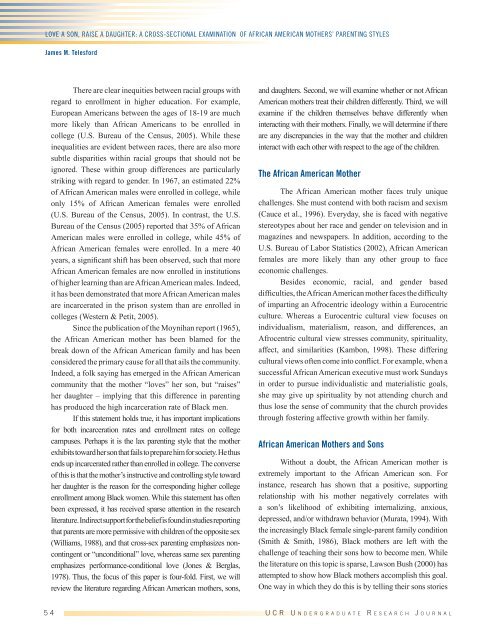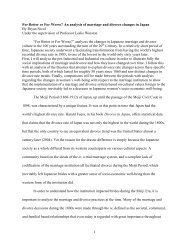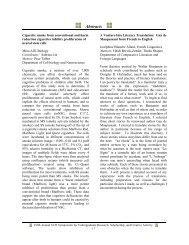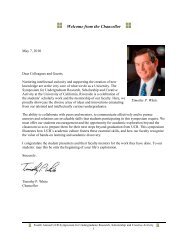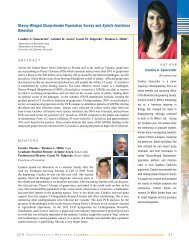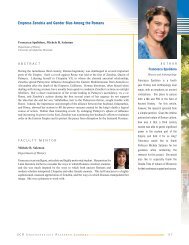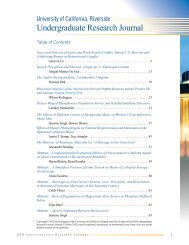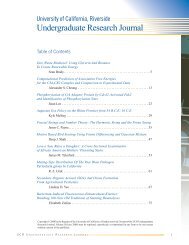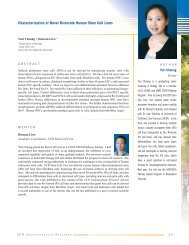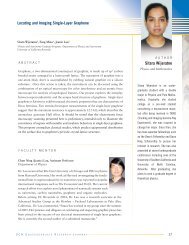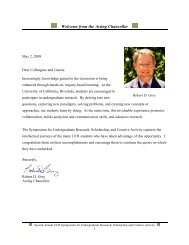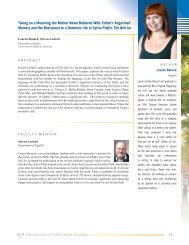Love a Son, Raise a Daughter - University of California, Riverside
Love a Son, Raise a Daughter - University of California, Riverside
Love a Son, Raise a Daughter - University of California, Riverside
You also want an ePaper? Increase the reach of your titles
YUMPU automatically turns print PDFs into web optimized ePapers that Google loves.
<strong>Love</strong> a <strong>Son</strong>, <strong>Raise</strong> a <strong>Daughter</strong>: A Cross-Sectional Examination <strong>of</strong> African American Mothers’ Parenting Styles<br />
James M. Telesford<br />
There are clear inequities between racial groups with<br />
regard to enrollment in higher education. For example,<br />
European Americans between the ages <strong>of</strong> 18-19 are much<br />
more likely than African Americans to be enrolled in<br />
college (U.S. Bureau <strong>of</strong> the Census, 2005). While these<br />
inequalities are evident between races, there are also more<br />
subtle disparities within racial groups that should not be<br />
ignored. These within group differences are particularly<br />
striking with regard to gender. In 1967, an estimated 22%<br />
<strong>of</strong> African American males were enrolled in college, while<br />
only 15% <strong>of</strong> African American females were enrolled<br />
(U.S. Bureau <strong>of</strong> the Census, 2005). In contrast, the U.S.<br />
Bureau <strong>of</strong> the Census (2005) reported that 35% <strong>of</strong> African<br />
American males were enrolled in college, while 45% <strong>of</strong><br />
African American females were enrolled. In a mere 40<br />
years, a significant shift has been observed, such that more<br />
African American females are now enrolled in institutions<br />
<strong>of</strong> higher learning than are African American males. Indeed,<br />
it has been demonstrated that more African American males<br />
are incarcerated in the prison system than are enrolled in<br />
colleges (Western & Petit, 2005).<br />
Since the publication <strong>of</strong> the Moynihan report (1965),<br />
the African American mother has been blamed for the<br />
break down <strong>of</strong> the African American family and has been<br />
considered the primary cause for all that ails the community.<br />
Indeed, a folk saying has emerged in the African American<br />
community that the mother “loves” her son, but “raises”<br />
her daughter – implying that this difference in parenting<br />
has produced the high incarceration rate <strong>of</strong> Black men.<br />
If this statement holds true, it has important implications<br />
for both incarceration rates and enrollment rates on college<br />
campuses. Perhaps it is the lax parenting style that the mother<br />
exhibits toward her son that fails to prepare him for society. He thus<br />
ends up incarcerated rather than enrolled in college. The converse<br />
<strong>of</strong> this is that the mother’s instructive and controlling style toward<br />
her daughter is the reason for the corresponding higher college<br />
enrollment among Black women. While this statement has <strong>of</strong>ten<br />
been expressed, it has received sparse attention in the research<br />
literature. Indirect support for the belief is found in studies reporting<br />
that parents are more permissive with children <strong>of</strong> the opposite sex<br />
(Williams, 1988), and that cross-sex parenting emphasizes noncontingent<br />
or “unconditional” love, whereas same sex parenting<br />
emphasizes performance-conditional love (Jones & Berglas,<br />
1978). Thus, the focus <strong>of</strong> this paper is four-fold. First, we will<br />
review the literature regarding African American mothers, sons,<br />
and daughters. Second, we will examine whether or not African<br />
American mothers treat their children differently. Third, we will<br />
examine if the children themselves behave differently when<br />
interacting with their mothers. Finally, we will determine if there<br />
are any discrepancies in the way that the mother and children<br />
interact with each other with respect to the age <strong>of</strong> the children.<br />
The African American Mother<br />
The African American mother faces truly unique<br />
challenges. She must contend with both racism and sexism<br />
(Cauce et al., 1996). Everyday, she is faced with negative<br />
stereotypes about her race and gender on television and in<br />
magazines and newspapers. In addition, according to the<br />
U.S. Bureau <strong>of</strong> Labor Statistics (2002), African American<br />
females are more likely than any other group to face<br />
economic challenges.<br />
Besides economic, racial, and gender based<br />
difficulties, the African American mother faces the difficulty<br />
<strong>of</strong> imparting an Afrocentric ideology within a Eurocentric<br />
culture. Whereas a Eurocentric cultural view focuses on<br />
individualism, materialism, reason, and differences, an<br />
Afrocentric cultural view stresses community, spirituality,<br />
affect, and similarities (Kambon, 1998). These differing<br />
cultural views <strong>of</strong>ten come into conflict. For example, when a<br />
successful African American executive must work Sundays<br />
in order to pursue individualistic and materialistic goals,<br />
she may give up spirituality by not attending church and<br />
thus lose the sense <strong>of</strong> community that the church provides<br />
through fostering affective growth within her family.<br />
African American Mothers and <strong>Son</strong>s<br />
Without a doubt, the African American mother is<br />
extremely important to the African American son. For<br />
instance, research has shown that a positive, supporting<br />
relationship with his mother negatively correlates with<br />
a son’s likelihood <strong>of</strong> exhibiting internalizing, anxious,<br />
depressed, and/or withdrawn behavior (Murata, 1994). With<br />
the increasingly Black female single-parent family condition<br />
(Smith & Smith, 1986), Black mothers are left with the<br />
challenge <strong>of</strong> teaching their sons how to become men. While<br />
the literature on this topic is sparse, Lawson Bush (2000) has<br />
attempted to show how Black mothers accomplish this goal.<br />
One way in which they do this is by telling their sons stories<br />
54 UCR Un d e r g r a d u a t e Re s e a r c h Jo u r n a l


